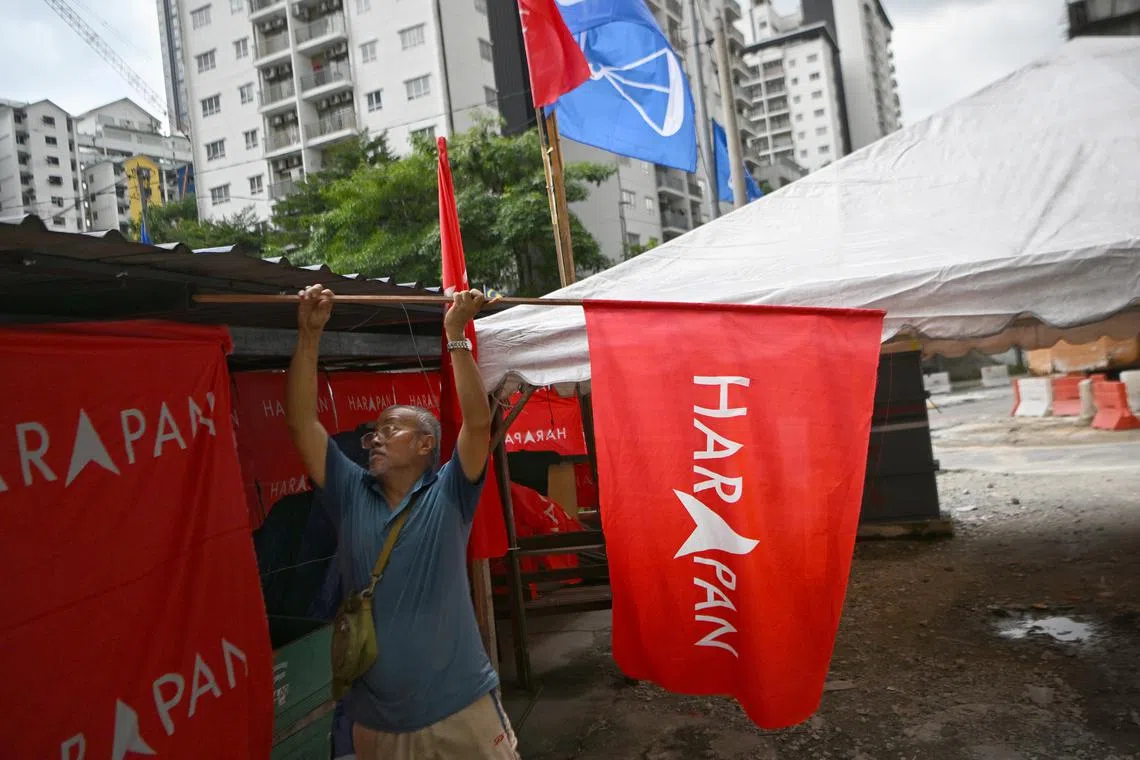Malaysia GE2022: Parties gear up for campaign flag-off
Sign up now: Get insights on the biggest stories in Malaysia
KUALA LUMPUR - The two-week campaign for Malaysia’s 15th General Election officially kicks off on Saturday in a multi-cornered battle that is likely to result in no clear winner after the Nov 19 vote.
Most contenders have had to rush to prepare for the polls that were not due until September 2023 but were controversially called when caretaker Prime Minister Ismail Sabri Yaakob dissolved Parliament on Oct 10,
The Meteorological Department said on Thursday that the north-east monsoon – which killed 54 in 2021 and caused RM6 billion (S$1.8 billion) in losses – is now expected to hit the country earlier,
The fragmented political landscape, with three main coalitions and dozens of independent blocs vying for power, is likely to see close to a thousand nominations submitted on Saturday for the 222 parliamentary seats, and hundreds more for the only three – out of 13 – state assemblies that have chosen to hold concurrent polls despite the impending deluge. The states of Perlis, Perak and Pahang were ruled by Umno.
All candidates will have to submit their papers between 9am and 10am at various centres in all 222 federal wards, with confirmation of names that will appear on the ballot papers expected before noon.
Analysts expect the ruling Barisan Nasional (BN) to garner the most seats in Parliament, putting the Umno-led coalition in pole position to form the next government.
Umno vice-president Ismail had dissolved Parliament after intense pressure from party president Zahid Hamidi’s faction, which had stridently insisted that they should capitalise on the momentum from the two-thirds supermajority wins in two state polls in the past year, as well as the unpreparedness of their opponents.
BN’s vote share in the Melaka and Johor state polls
But opinion polls showed approval of the Ismail administration was at 31 per cent in October, lower than the 39 per cent mark in April 2018, just weeks before Najib Razak – now jailed over the 1Malaysia Development Berhad scandal
Zahid, as the head of BN, also chose to drop a slew of dissidents from the BN candidate slate who were either critical of him or were Ismail supporters, triggering backlash that has seen at least two of those dropped deciding to defend their seats as PN nominees.
There have also been last-minute changes to PN’s line-up as well as internal bickering over PH’s decision to drop popular leaders in several seats, especially across its stronghold of Selangor, Malaysia’s richest state.

Amanah Party volunteer Haji Ahmad Kelana putting up Pakatan Harapan flags in Titiwangsa, Selangor, on Nov 3.
ST PHOTO: ARIFFIN JAMAR
“At this point in time, with the lower-than-expected level of Malay voter support for BN, it is possible to imagine that no single coalition will attain a large enough plurality to form a government with just one other party or coalition,” said Merdeka Centre for Opinion Research on Friday in its release of its October survey data.
This implies that whether it is BN, PH or PN, or a combination of two of these coalitions, the support of Gabungan Parti Sarawak (GPS), which dominates the eastern state, could be crucial
PH came to power in 2018 and Tun Dr Mahathir Mohamad became prime minister, but the coalition’s reign lasted just 22 months. It crumbled due to ebbing support from the crucial Malay Muslim demographic, which makes up the majority in about six of 10 parliamentary wards.
Tan Sri Muhyiddin was sworn in as premier in March 2020
PN and GPS agreed to back Datuk Seri Ismail as premier in Aug 2021,
Critics accuse Zahid and his allies of pushing for snap polls ahead of a verdict in his corruption trial expected in early 2023.
Whether that narrative will hurt the former deputy premier enough will be tested as he defends his Bagan Datok seat against PH’s Datuk Seri Shamsul Iskandar Akin who has a track record of giant-killing.
The coastal seat in Perak is one of several closely watched contests in the swing state which observers say could be a bellwether for who triumphs at national level. This includes Datuk Seri Anwar’s attempt to take Tambun

A campaign poster of Tambun incumbent Faizal Azumu in Tambun, Perak.
ST PHOTO: KUA CHEE SIONG



